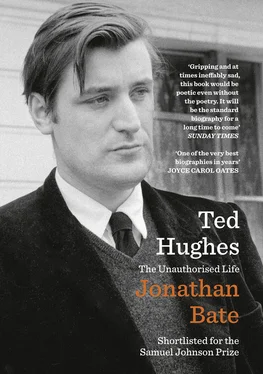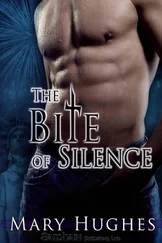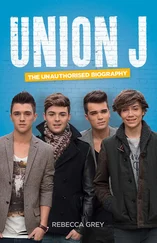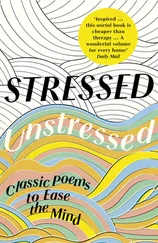The Yorkshire house, up on the hill, is called the Beacon. Square, rather squat, of dark-red brick, not the local gritstone that grounds those dwellings that seem truly to belong to the place. It stands, a little apart from its neighbours, on a long straight road at Heptonstall Slack, high above Hebden Bridge. It commands a sweeping view of hill and vale, down towards Lumb Bank, which would be another place of memory. This was the home of Ted Hughes’s parents when they returned to the Yorkshire Moors and the Calder Valley while he was at Cambridge University. A return to their roots, away from the unlovely town of Mexborough, further south, though still in Yorkshire, in the industrial area between Rotherham and Sheffield. Mexborough Grammar had been the school that prepared Ted Hughes for the Cambridge entrance examination.
The move to the Beacon was a sign of upward mobility. Edward James Hughes, like his elder brother and sister Gerald and Olwyn, was born and raised in a cramped end-terrace dwelling in the village of Mytholmroyd. In Mexborough, they had lived behind and above the newspaper and tobacco shop where William and Edith Hughes made their living. It was a matter of pride that they were eventually able to buy a detached house with a name and a view, just as it was a matter of pride that their boy Ted had got into Cambridge. They were not to know that he would rise even higher: that the boy from the end-terrace near the mill would fish privately with Queen Elizabeth the Queen Mother, talk of shamanism with a man born to become king and, just days before he died, receive from the hands of the Queen her highest personal honour, the Order of Merit.
The Beacon became a house of memory. It was here that Ted brought his bride, Sylvia Plath, to meet his parents in 1956. It was from here that he took Sylvia – playing Heathcliff to her Cathy – on a day trip to Top Withens, the ruined farmhouse believed to be the original of Wuthering Heights. It was here that the family gathered on the day that Sylvia was buried, near the family plot, just down the road in Heptonstall graveyard. It was here that he came at moments of crisis in later relationships: when he was thinking of buying Lumb Bank and making a home there with Assia Wevill and when he found himself having to choose between two women in 1970. It was to here that he and his sister Olwyn brought back their mother (‘Ma’) in the last days of her life and here that he came after seeing her cold body in the Chapel of Rest down in Hebden Bridge.
And it was here that he sometimes fought with Sylvia. ‘You claw the door,’ he wrote in a poem called ‘The Beacon’. The woman desperate to escape the house. Torrential Yorkshire rain crashes against the windowpanes. Inside the houses, on hillside and in valley, the lights of evening twinkle. ‘The Beacon’ gives a glimpse of Ted Hughes writing about domestic life. Yet it is also a poem of death, of graves and eternal silence. A beacon of memory, shining into the past. The memory of Sylvia among the Hugheses: chit-chat, telly, doing the dishes. Then a row, an explosion of anger. Sylvia, a trapped animal, brought fresh from the shining shore of the New World and confined in Yorkshire cold, Yorkshire grime, Yorkshire ways she does not really understand. She claws the door. Hughes at his most characteristic was a poet of claws and cages: Jaguar, Hawk and Crow. A poet who turns event and animal to myth.
Yet he was also a poet of deep tenderness, of restorative memory. If ‘The Beacon’ shines the light of memory into the past, there is another light that reaches forward with hope to the future, to redemption. In perhaps the greatest of his later poems, he calls it ‘a spirit-beacon / Lit by the power of the salmon’. This other beacon is found in an epiphanic morning moment when he stands waist-deep in pure cold Alaskan river water with his beloved son Nicholas. Here the ‘inner map’ of wild salmon becomes the cartography of Hughes’s own life: smoke-dimmed half-light of Calder Valley and wartime memory of ‘the drumming drift’ of Lancaster bombers. ‘Drumming’ had been one of Hughes’s signature words ever since the ‘drumming ploughland’ of ‘The Hawk in the Rain’, title poem of his first volume.
The poem is called ‘That Morning’.3 Even a word as seemingly flat as ‘that’ is often full of resonance in Hughes: not any morning, but that morning, that magical, memorable, poetical, immortal morning. The poem ends with a redemptive couplet that rhymes with itself: ‘So we stood, alive in the river of light / Among the creatures of light, creatures of light.’4 It is a poem about life at its best not only because Hughes is doing something that he loves in a location that is utterly sublime, but above all because he is together (‘ we stood’) with his only son, who lives on the other side of the world. It is a poem full of heart, of love. A few years later Ted would urge Nick to ‘live like a mighty river’. ‘The only calibration that counts’, he wrote in a magnificent letter following another fishing trip, ‘is how much heart people invest, how much they ignore their fears of being hurt or caught out or humiliated. And the only thing people regret is that they didn’t live boldly enough, that they didn’t invest enough heart, didn’t love enough. Nothing else really counts at all.’5
The closing couplet of ‘That Morning’ is now inscribed on Ted Hughes’s memorial stone in Poets’ Corner. The national literary shrine in Westminster Abbey is indeed the place where England’s last permanent, as opposed to fixed-term, Poet Laureate in one sense belongs. But his spirit was only at peace in moorland air or when casting his rod over water, so it is fitting that his ashes are not there in the Abbey. Their place of scattering is marked by another stone, far to the west of his England.
Ted Hughes is our poet of light, but also of darkness. Of fresh water but also of polluted places. Of living life to the full, but also of death. And among his creatures are those not only of light but also of violence. We must celebrate his ‘dazzle of blessing’ but we cannot write his life without being honest about the ‘claw’, without confronting what in ‘That Morning’ he calls the wrong thoughts that darken.
In view of Hughes’s supernatural solicitings and given all the associations of the name Beacon, it was with grim satisfaction that, in the matter of Jane Anderson versus Avco Embassy Pictures and others, he found himself represented by Palmer and Dodge, working in conjunction with Peabody and Arnold, counsel for the lead defendant (Avco). These were two of Boston’s oldest and most respected law firms. Both had their premises at the auspicious address of 1 Beacon Street.
It was there on the morning of Thursday 3 April 1986, a week after Ted had made his Deposition, that Alexander (Sandy) H. Pratt Jr, acting on behalf of the defendants, asked some questions of Dr Anderson. Mr Pratt: ‘You felt, I take it, that Sylvia Plath wrote what she wrote in the book about the character Joan Gilling because she was hostile and angry towards you?’
Ms Grace: ‘Objection.’
Mr Pratt told Jane Anderson that she could answer. She replied, hesitantly: ‘I wouldn’t say – I would say that one of the reasons that she wrote what she wrote was – again, this is a hypothesis – but that she had some angry feelings towards me.’
Why was she angry? Because, said Anderson, of what took place when she visited Sylvia Plath in Cambridge, England, on 4 June 1956.6 That is to say, just over three months after Sylvia first met Ted Hughes ‘at a party’ and just twelve days before she married him in a swiftly arranged private ceremony in London. So what had happened at the meeting?
Sylvia Plath started talking in a very pressured way. That was my perception, that it was pressured. She said that she had met a man who was a poet, with whom she was very much in love. She went on to say that this person, whom she described as a very sadistic man, was someone she cared about a great deal and had entered into a relationship with. She also said that she thought she could manage him, manage his sadistic characteristics.
Читать дальше











